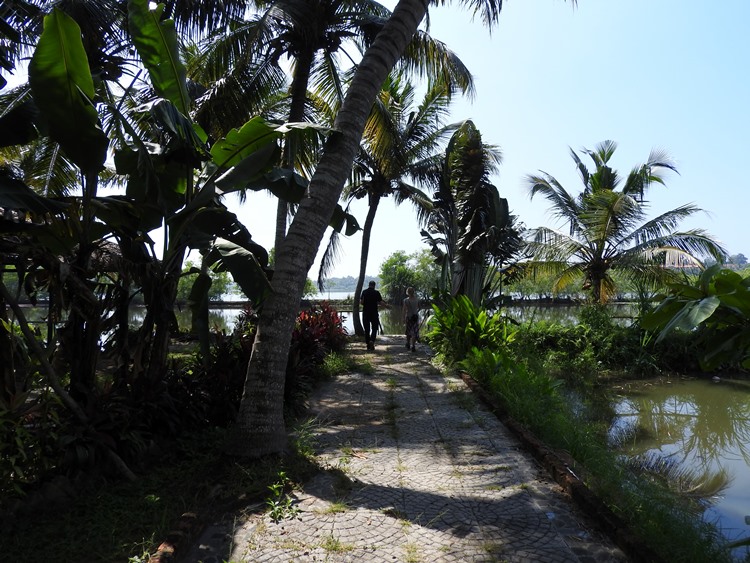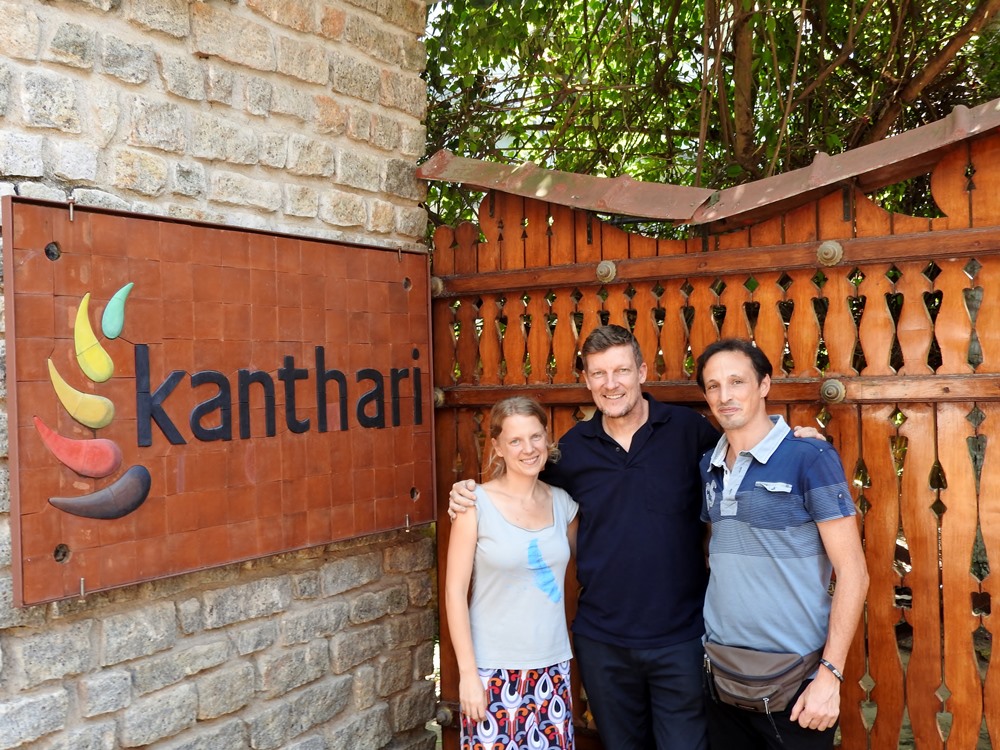

ExChange The World: Partnership for the Goals
by Anna Książek and Andrea Pucci on the 15/06/2021
This blog was originally written for ExChange The World.
Find out more about at Sustainable Development Goal 17, Partnership for the Goals.
A Spicy Change
KANTHARI | India
kanthari organizes leadership training courses for social changemakers from all over the world inviting them to its venue in Kerala, India, for a scholarship-based program: 7 months on campus during which they learn how to create and develop their own social project, they gain confidence and network. Followed by 5 months of mentorship support once they return to their communities, where they will make the difference they wish to see.
The first time we heard about kanthari was 6 years ago, from a Polish alumnus, Tomasz Kozakiewicz. He created the alumni network named kanthari+ and invited us to participate in one of their meetings. It was him who introduced us to Yoshimi Horiuchi, a blind Japanese woman who created a mobile library in a small Thai village delivering books to those who can't visit the stationary library: people with disabilities, the elderly and tribal people who live in isolated mountainous areas. We spent a week volunteering in her organization Always Reading Caravan, and this gave us a great opportunity to observe what a ‘kanthari’ is.

Picture: India, January 2020. Kanthari center where once a year people from all over the world come to learn how to be social leaders and bring change to their local communities.
Changemakers who want to become a kanthari can apply to the course when they meet the following criteria: Being at least 22 years old, possess communicative English and basic computer skills, and most importantly, they bring an idea that creates a positive impact. During the course, this idea will be further shaped and improved. Unlike other leadership courses around the world, you need no specific pre-education or diploma to jump in. What really counts is your experience – preferably this includes having overcome some form of adversity, for example, a disability, having faced domestic violence, having grown up in conflict areas, climate challenges etc. That's where their strength comes from. Their spiciness.
“kanthari” is the name of a small but extremely hot chilli, which possesses several medicinal qualities; it lowers blood pressure, purifies the blood and it makes you awake better than any coffee. It is also how adults in Kerala name a child who is a bit naughty and challenges the status quo. And that's what they want at kanthari - more people asking ‘why?’. An inner intrinsic drive provides a lot of energy, strength and motivation that are required to create an impact. No matter how much energy, time and resources the change would require, they will go for it.
Among their alumni, there are 226 people from 48 countries. They started more than 130 organizations already and the number is growing. On average, they reach 50.000 people a year.
Monicah Kaguithia fights against the practice of Female Genital Mutilation in Kenya. Forced into marriage at the age of 16, she was supposed to be circumcised once she would have delivered her first baby. But, when the water broke, she fled through the bush and finally delivered her baby safely and escaped being circumcised. What she could not escape was the physical and emotional abuse as a result of not conforming to the harmful tradition. Monicah went to kanthari because she wanted to protect the rights of women and girls in Kenya by changing social norms and cultural practices.*
Jayne Waithera from Kenya was born with albinism. Due to superstition, people with albinism are believed to possess special powers. Because of this, body parts of people with Albinism are worth a lot of money and therefore, they are hunted and killed. Janye conducts sensitization campaigns to protect the rights of these people.
Being a domestic migrant worker in Lebanon, Rahel Zegeye Zewudu who originates from Ethiopia has experienced first-hand what it is to be treated unfairly and inhuman for years on end. This led her to start Mesewat, an organisation that advocates for rights and strengthens the work of domestic migrant workers in Lebanon.
Harriet Kamashanyu founded Rhythm of Life, an organization that aims is to end the stigmatization and social exclusion of sex workers in the red light district of Kampala, Uganda. In the long run, they want to end the vicious cycle where daughters of sex workers also end up becoming sex workers.
For the first few years of her life, Samantha Mudiriro was homeless and lived on the streets with her mother. She was lucky to be placed in an SOS children's home. Growing up there inspired her to start a rehabilitation centre for street children in Zimbabwe. She wants these children to have access to shelter, a safe environment, education, health facilities, and job opportunities.

Picture: India, January 2020. From the left Anna Książek, Paul Kronenberg - co-founder of Kanthari and Andrea Pucci in front of Kanthari center in Trivandrum, India.
George K Thomas was a victim of a road accident and because of this, he is a wheelchair user. His organisation Freedom on Wheels advocates for the rights of disabled people as well as for better accessibility and a wheelchair-friendly India.
Emmanuel Mbaji Mruu from Mombasa, Kenya, started Takkazi, an organisation that generates employment through the collection, segregation, and recycling of plastic waste.
Stephen Onyang lost several family members due to AIDS. He adopted the children of his brother and opened the Hope Restoration centre that, through education, transforms the lives of HIV orphans in Kisumu, close to Lake Victoria in Kenya.
Ojok Simon who hails from Northern Uganda was still a child when rebels of the Lords Resistance army tried to kidnap him and hit him on the head with the back of a rifle, making him lose most of his sight. His love for honey gave him strength and energy to start Hive Uganda, an organisation that trains blind people to become beekeepers.
We met Abhijit Sinha, founder of Project DEFY in person. As an alternative to the Indian educational system, his organisation creates “schools without teachers”. By setting Nooks - low-cost rural maker spaces, where people design their own education and choose what they want to learn, they are bringing education to the hands of the people.
"kanthari was one of the first to believe in this idea - says Abhijit - and helped me to develop it in many ways. Going to kanthari was like a 7 months meditation period, thinking deeply about what I want to do. We had a great training on how to start an organization, fundraising, marketing, branding, writing proposals and much more. What I also found amazing was the opportunity to discuss my idea with people from 18-19 different countries. It was like having all world giving their perspective on your concept, asking questions, helping you understand how this idea works in a global setting, not only the Indian one. Being in kanthari took away all the loneliness I had in the previous 1,5 years. People from my environment were not able to understand what is going through my mind. In kanthari I met people from different countries who had a similar drive, they understood matters which even my family or friends couldn't get."
kanthari tells you – you can do it. But you need to be prepared. You should be part of your own target group to be able to recognize their needs, to speak the same language, to be immersed in a culture that is a daily reality of those you want to work with. It will make it easier for you to gain trust and to get started. But you also need to go through all legal matters, policies, accounting. You need to have regulations, a code of conduct, branding. You learn how to speak, how to tell and present your story. And of course, you learn how to raise funds. kanthari gives their participants specific fundraising tools, which if implemented step by step, help to raise money and sustain the project. They’ve used them for many years to sustain their own projects. All kanthari participants receive a scholarship that covers the costs of the training and board and lodging for the duration of the course in India. The participants need to cover costs for their visa, travel to and from India, health insurance and any personal costs.
The idea to set up kanthari was inspired by the mistakes and difficulties Paul Kronenberg and Sabriye Tenberken, founders of kanthari, faced back in the late 90s when they started their organisation Braille Without Borders in Tibet.
Paul from the Netherlands and Sabriye from Germany who is blind herself, met in Tibet in 1997, where they got touched by the life of blind children. In Tibet blindness is often considered as a punishment for something bad that was done in a previous life. Blind children were discriminated against and locked away. Sabriye was very frustrated by the situation, but she met one blind child who was quite confident. She realized the core difference between him and his peers was that he was a shepherd. He had a task. If you have a task, then you have value. If you have value, you are respected. If you are respected, then you have dignity. And only if you have dignity you can become self-confident.
One year later Sabriye and Paul went back to Tibet together to try and change the fate of blind children. In the initial years, they faced numerous challenges; they had to leave the country because of visa issues, they lived in extreme conditions, not earning anything for their work, having difficulties raising funds for what they believed was needed.
Finally, they managed to implement their visions and created 4 programs:
- A preparatory school for blind children;
- A Braille Printing press;
- A vocational training farm for blind adolescents with training opportunities in making cheese, bread, compost, cooking, agriculture, carpet weaving, knitting, animal husbandry, market gardening, lots of professions which were not done by blind people before;
A self-integration program to help their students to integrate themselves into regular schools.
Paul and Sabriye knew that they would not be able to stay in Tibet forever. Therefore, they wanted to have some of their former students to be trained so they could take over their roles. They started to look for leadership courses all over the world and they realized there is none that would accept people without higher education and training that was based on experiential learning. They decided to open one.
They took some time to create a wishlist of where the centre should be and how it should look like. With this list in hand, a search for the perfect location began. 48 locations in Kerala were visited but none of them met their criteria. They wanted it to be in a rural, natural and inspiring place, quietness and a waterbody were a must. Yet the place should still be not too far from a city and an international airport; that's how the current location is. Next to the Vellayani lake, surrounded by trees, plants, animals and silence, with carefully designed buildings inspired by Laurie Baker's work, in an eco-friendly and cost-effective style. In 2013, kanthari was awarded as the 2nd greenest campus in India and annually a few thousand architecture and engineering students visit the campus. Paul welcomes them speaking a bit about the ideas behind their buildings, but not too much as many among them didn’t start their study by choice, but because their parents wanted them to be architects. In India, the status of a job plays a very important role and the pressure on the shoulders of these young students is huge. At the end of Paul’s talk he asks the students to do three things:
"Spread the news about kanthari so that it has more chances to get to the right people.
Whatever it is the students will design and construct, to make sure that it is eco-friendly and cost-effective.
and last… Tomorrow when brushing the teeth, to look in the mirror and see who is looking back. If they see an architect, someone who is a born architect - that's good. If that is not the case… to get out!"
If they continue, they will not make a good architect, they will be a ‘Thank-God-is-Friday’ architect, it will be just a job without any inspiration. They won't build anything nice because they don't really care and the next 30-40 years of their life will most likely be wasted!
Paul’s life motto is simple: Life is what you are happy getting up for.
What Paul suggests to these students may be good advice to any of us. A message we fully embrace. Look at the mirror and create your story!
* Description of participants from kanthari.org (https://www.kanthari.org/)

0 comments
No comments on this blog yet. Would you like to be the first?